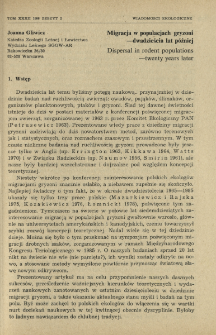- Search in all Repository
- Literature and maps
- Archeology
- Mills database
- Natural sciences
Advanced search
Advanced search
Advanced search
Advanced search
Advanced search

Object
Title: Migracja w populacjach gryzoni - dwadzieścia lat później
Subtitle:
Migracja w populacjach gryzoni - 20 lat później ; Dispersal in rodent populations - twenty years later
Contributor:
Polska Akademia Nauk. Komitet Ekologii
Publisher:
Place of publishing:
Description:
Strony 137-154 ; 24 cm ; Bibliografia na stronach 150-153 ; Streszczenie w języku angielskim
Type of object:
Abstract:
Ecological aspects of dispersal phenomenon are reviewed and discussed. The dispersal is understood as a movement of individuals away from their home areas for purpose of establishing on new sites. Since early seventies this behavioral event, most probably with genetic background and of important conseąuences for population dynamics, has been. in the phocus of smali mammal studies. Most studies on dispersal were done in cyclic rodent populations, and dispersal was considered a driving force for population cycles. Now, it is belived that dispersal is neccessary but not sufficient for an occurrance of regular density cycles. However, it remains as an important component of two theories (Chitty-Krebs and Charnov-Finerty) which attempt to explain the naturę of density cycles in rodents. In non-cyc- lic (stable) populaticans, dispersal plays an important role in density regulation (Łomnicki 1978). The dispersal rates vary significaintly with seasons, being the highest in early summer and in autumn (Gliwicz in press a, b). Dispersers leaving their home ranges in the two seasons have different characteristics, corresponding to those givein by Lidicker (1975) for presaturation and saturation dispersers. The contemporary views on the evolution of dispersal and on its ultimate and proximal causes are discussed, and examples of ecological and evolutionary effects of dispersal are given.
Relation:
Volume:
Issue:
Start page:
End page:
Detailed Resource Type:
Resource Identifier:
oai:rcin.org.pl:206557 ; 0013-2969
Source:
MiIZ PAN, sygn. P.3259 ; click here to follow the link
Language:
Language of abstract:
Rights:
Licencja Creative Commons Uznanie autorstwa 3.0 Polska
Terms of use:
Zasób chroniony prawem autorskim. [CC BY 3.0 PL] Korzystanie dozwolone zgodnie z licencją Creative Commons Uznanie autorstwa 3.0 Polska, której pełne postanowienia dostępne są pod adresem: ; -
Digitizing institution:
Muzeum i Instytut Zoologii Polskiej Akademii Nauk
Original in:
Biblioteka Muzeum i Instytutu Zoologii PAN
Projects co-financed by:
Access:
Object collections:
- Digital Repository of Scientific Institutes > Partners' collections > Museum and Institute of Zoology PAS > Scientific Journals
- Digital Repository of Scientific Institutes > Literature > Journals/Articles
Last modified:
Feb 4, 2025
In our library since:
Aug 25, 2021
Number of object content downloads / hits:
64
All available object's versions:
https://rcin.org.pl./publication/152009
Show description in RDF format:
Show description in RDFa format:
Show description in OAI-PMH format:
| Edition name | Date |
|---|---|
| Z. 2. Migracja w populacjach gryzoni - dwadzieścia lat później / Gliwicz J. | Feb 4, 2025 |
Objects Similar
Skarlato, O.A., Red.

 INSTYTUT ARCHEOLOGII I ETNOLOGII POLSKIEJ AKADEMII NAUK
INSTYTUT ARCHEOLOGII I ETNOLOGII POLSKIEJ AKADEMII NAUK
 INSTYTUT BADAŃ LITERACKICH POLSKIEJ AKADEMII NAUK
INSTYTUT BADAŃ LITERACKICH POLSKIEJ AKADEMII NAUK
 INSTYTUT BADAWCZY LEŚNICTWA
INSTYTUT BADAWCZY LEŚNICTWA
 INSTYTUT BIOLOGII DOŚWIADCZALNEJ IM. MARCELEGO NENCKIEGO POLSKIEJ AKADEMII NAUK
INSTYTUT BIOLOGII DOŚWIADCZALNEJ IM. MARCELEGO NENCKIEGO POLSKIEJ AKADEMII NAUK
 INSTYTUT BIOLOGII SSAKÓW POLSKIEJ AKADEMII NAUK
INSTYTUT BIOLOGII SSAKÓW POLSKIEJ AKADEMII NAUK
 INSTYTUT CHEMII FIZYCZNEJ PAN
INSTYTUT CHEMII FIZYCZNEJ PAN
 INSTYTUT CHEMII ORGANICZNEJ PAN
INSTYTUT CHEMII ORGANICZNEJ PAN
 INSTYTUT FILOZOFII I SOCJOLOGII PAN
INSTYTUT FILOZOFII I SOCJOLOGII PAN
 INSTYTUT GEOGRAFII I PRZESTRZENNEGO ZAGOSPODAROWANIA PAN
INSTYTUT GEOGRAFII I PRZESTRZENNEGO ZAGOSPODAROWANIA PAN
 INSTYTUT HISTORII im. TADEUSZA MANTEUFFLA POLSKIEJ AKADEMII NAUK
INSTYTUT HISTORII im. TADEUSZA MANTEUFFLA POLSKIEJ AKADEMII NAUK
 INSTYTUT JĘZYKA POLSKIEGO POLSKIEJ AKADEMII NAUK
INSTYTUT JĘZYKA POLSKIEGO POLSKIEJ AKADEMII NAUK
 INSTYTUT MATEMATYCZNY PAN
INSTYTUT MATEMATYCZNY PAN
 INSTYTUT MEDYCYNY DOŚWIADCZALNEJ I KLINICZNEJ IM.MIROSŁAWA MOSSAKOWSKIEGO POLSKIEJ AKADEMII NAUK
INSTYTUT MEDYCYNY DOŚWIADCZALNEJ I KLINICZNEJ IM.MIROSŁAWA MOSSAKOWSKIEGO POLSKIEJ AKADEMII NAUK
 INSTYTUT PODSTAWOWYCH PROBLEMÓW TECHNIKI PAN
INSTYTUT PODSTAWOWYCH PROBLEMÓW TECHNIKI PAN
 INSTYTUT SLAWISTYKI PAN
INSTYTUT SLAWISTYKI PAN
 SIEĆ BADAWCZA ŁUKASIEWICZ - INSTYTUT TECHNOLOGII MATERIAŁÓW ELEKTRONICZNYCH
SIEĆ BADAWCZA ŁUKASIEWICZ - INSTYTUT TECHNOLOGII MATERIAŁÓW ELEKTRONICZNYCH
 MUZEUM I INSTYTUT ZOOLOGII POLSKIEJ AKADEMII NAUK
MUZEUM I INSTYTUT ZOOLOGII POLSKIEJ AKADEMII NAUK
 INSTYTUT BADAŃ SYSTEMOWYCH PAN
INSTYTUT BADAŃ SYSTEMOWYCH PAN
 INSTYTUT BOTANIKI IM. WŁADYSŁAWA SZAFERA POLSKIEJ AKADEMII NAUK
INSTYTUT BOTANIKI IM. WŁADYSŁAWA SZAFERA POLSKIEJ AKADEMII NAUK




































